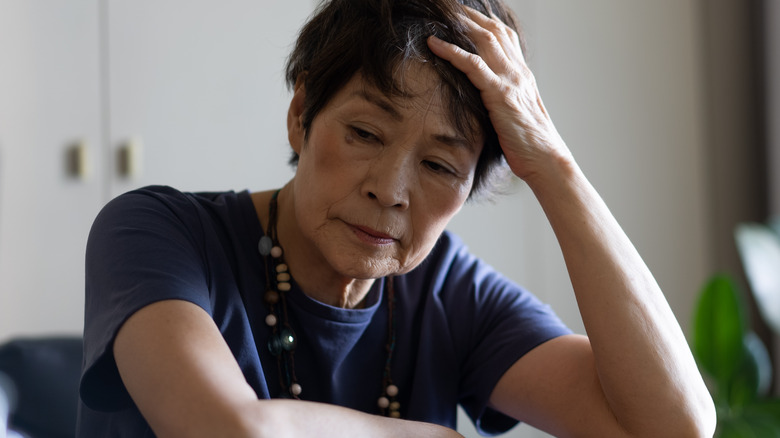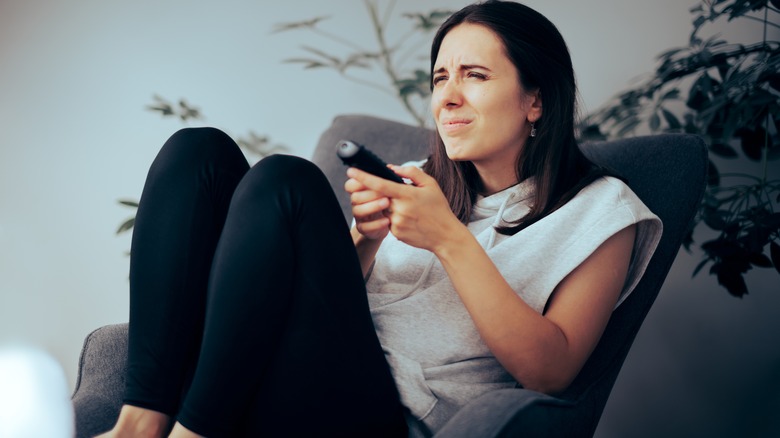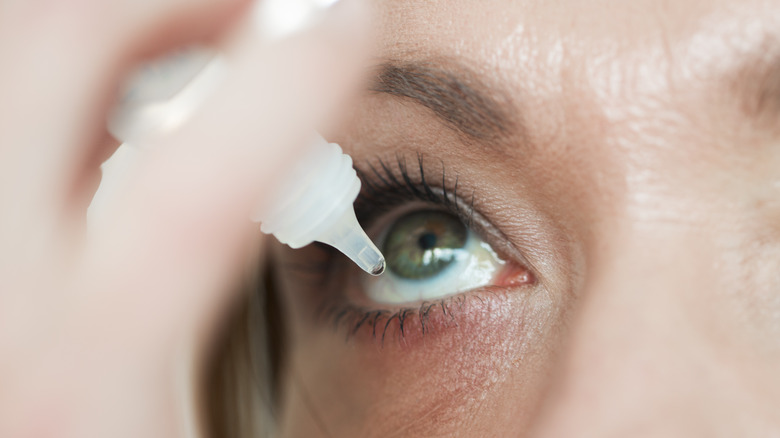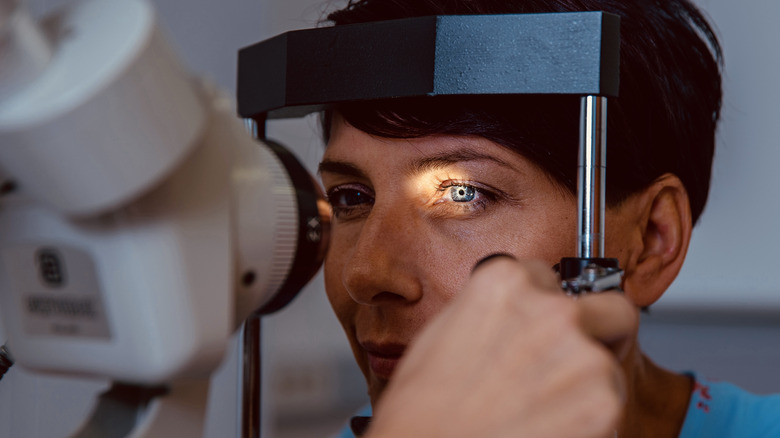When You're Anxious, This Is What Happens To Your Eyes
Anxiety is a feeling of dread, fear, worry, and unease that leads to sweating, restlessness, tension, and rapid heartbeat, according to Medline Plus. Everyone in the world feels stressed and anxious sometimes, but others experience chronic anxiety that affects their lives. This type of anxiety is known as an anxiety disorder. For example, someone with excessive worries over ordinary issues may struggle with generalized anxiety disorder, while someone who suffers from panic attacks might have panic disorder. This type of anxiety can make it difficult to do common tasks like work or leave your house.
Anxiety disorders come with a range of different symptoms, and can affect your digestive system, sleeping, muscles, and eyes. A person who is struggling with anxiety disorder, for instance, experiences eye strain, headaches, and vision distortions. Chronic anxiety also affects dry eye disease and glaucoma. Get a clearer view of how anxiety affects your eyes, as well as how you can deal with them.
If you or someone you know needs help with mental health, please contact the Crisis Text Line by texting HOME to 741741, call the National Alliance on Mental Illness helpline at 1-800-950-NAMI (6264), or visit the National Institute of Mental Health website.
Eye strain and headaches from stress response
You know your pupils open to get more light in when it's dark. But light isn't the only thing your pupils respond to. According to the Discovery Eye Foundation, your pupils also get bigger when your body is subjected to stress, activating your flight-or-fight response. When you're in danger, bigger pupils allow you to see more clearly than you would under normal circumstances. However, you don't really need that acuity during a typical day. Therefore, the dilation of the pupils can cause your eyes to fatigue and lead to strain.
Eye strain is a common condition, per the Mayo Clinic. It may also come with various irritating symptoms like burning and itchy eyes, watery eyes, blurred vision, headaches, and difficulty concentrating. The dilation of the pupils from anxiety also lets more light in, making you more sensitive to light. An eye-strain-induced headache can be felt over the eyes or in the bridge of the nose. It's also possible to experience pain in the temples. Fortunately, the pain gets better with rest, per Healthline.
The best thing to do for eye strain is to rest your eyes. Try a warm compress over the eyes. The Mayo Clinic recommends trying stress management and relaxation techniques to help with your anxiety. So, close your eyes and work on deep breathing or meditation. Feeling relaxed and calm keeps your eyes from overworking.
Vision distortions experienced with anxiety
The expansion of your pupils during bouts of anxiety can also cause distortions like blurred or double vision, floaters, and tunnel vision. According to Fleet Street Whitby & Co., the rush of adrenaline from stress increases the pressure in the back of the eye. The added pressure causes things to get slightly out of focus, leading to blurry and double vision since your eyes aren't focusing correctly. The Calm Clinic notes that hyperventilation from increased anxiety can play a role in blurry vision as well.
Tunnel vision is a loss of peripheral vision, so it appears that things are in a tunnel, states the Cleveland Clinic. You might even notice that the edges of your vision get a bit fuzzy when experiencing increased anxiety. This response helps you to focus on one thing at a time when anxious, but can be irritating when it comes out of nowhere, per Axiom Medical. Floaters in your vision become more noticeable. According to the National Eye Institute, floaters come from eye changes as you age. The fluid in your eyes sticks together, creating the floaters.
Vision distortions come directly from your stress response; therefore, anxiety treatments are necessary to help deal with distortions. Healthline notes that treatments like cognitive-behavior therapy, medication, and lifestyle changes work the best. These are also typically used in conjunction with each other.
Anxiety linked to dry eyes
Repeated and chronic anxiety creates changes within the eye itself, leading to problems. A hospital-based study of 1,458 consecutive outpatients published in the Pakistan Journal of Medical Sciences found those with depression, anxiety, and stress are more likely to experience dry eye disease. Additionally, the results showed that a family history of the disease also played a role.
Meanwhile, research published in the Journal of Cornea and External Disease states that "sleep quality may play an important role in the development of DED by influencing tear secretion and tear film stability and/or by indirectly aggravating anxiety and depression." Therefore, low quality of sleep from anxiety may play a role in developing dry eyes.
According to the Mayo Clinic, dry eye disease leads to symptoms like stinging, burning, scratchy eyes, light sensitivity, eye redness, and blurred vision. It makes your eyes uncomfortable due to disrupting the healthy tear film. It can also cause complications like eye infections, damage to the surface, and eye inflammation.
Over-the-counter eye drops can be used to create artificial tears to treat the disorder, per the National Eye Institute. Prescription medications and surgery might also be needed to alleviate the problem and get you seeing clearly again.
Chronic stress can worsen glaucoma
Every person in the world has pressure in their eyes; this is why they puff air into your eyes during eye exams. The pressure elevates during times of stress, per the American Academy of Ophthalmology. Occasional pressure changes during stressful situations aren't a big deal. Still, when you're chronically feeling anxiety, the pressure changes can be harmful to the optic nerve, which can be a big problem for those with glaucoma.
Glaucoma is a progressive eye disease where high pressure in the eye leads to loss of vision due to damage to the optic nerve, according to Johns Hopkins Medicine. An estimated 3 million people in the U.S. experience the disease, which causes blurred vision, eye pain, halos and rainbows, and headaches. Without proper treatment, it can lead to blindness. According to the Glaucoma Research Foundation, stress can temporarily impair the vision quality of those with glaucoma and make their perception worse by affecting the functioning of the optic nerve.
Getting treatment for your anxiety by getting enough sleep and controlling stressors helps alleviate the temporary symptoms. It's also important to get treatment for your glaucoma through medicated drops and, if necessary, surgery.





